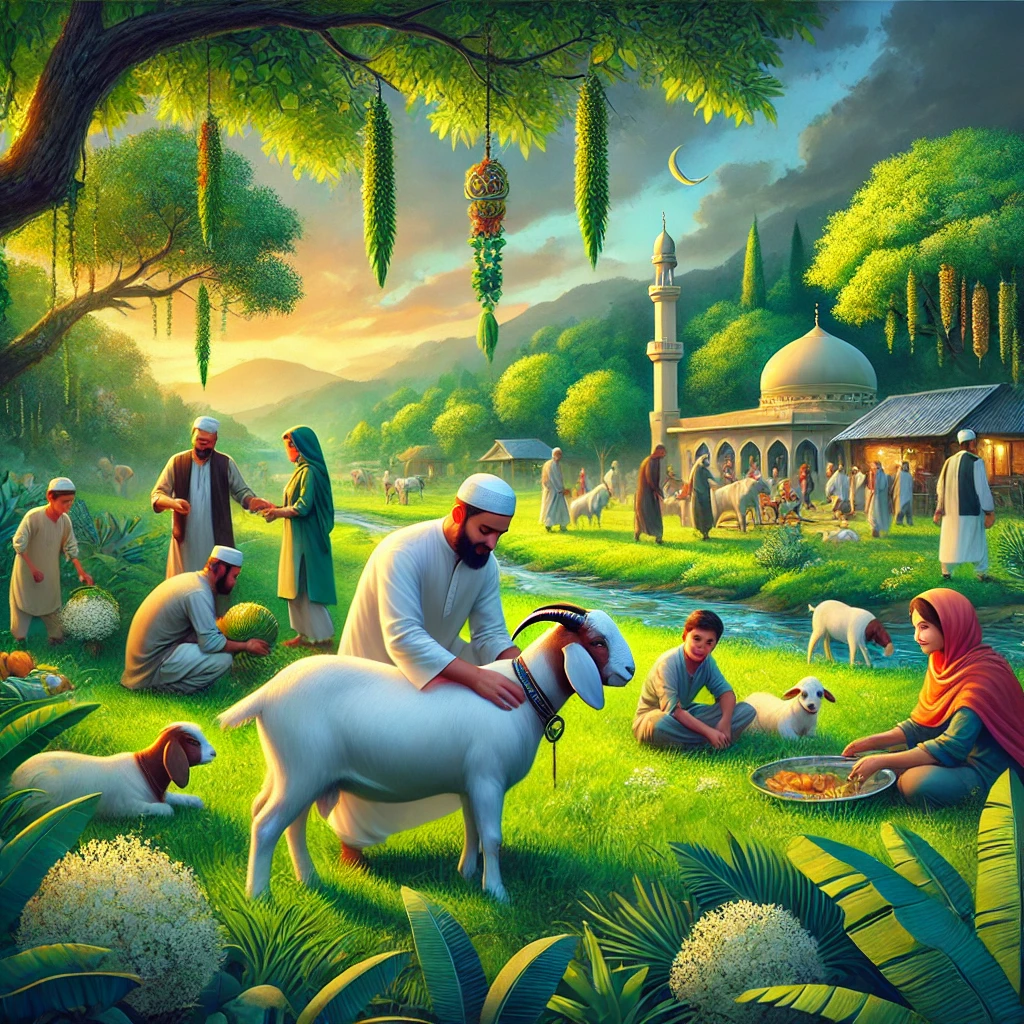Introduction
Bakra Eid, also known as Eid al-Adha, is one of the most significant festivals in Islam, celebrated with immense fervor by Muslims around the world. This festival commemorates the willingness of Prophet Ibrahim (Abraham) to sacrifice his son as an act of obedience to God. In modern practice, Muslims perform the ritual of Qurbani, or animal sacrifice, to honor this event. Beyond its religious significance, Qurbani during Bakra Eid has notable financial benefits for the Muslim community. This article delves into these economic advantages, drawing insights from the Quran and authentic Hadith.
The Concept of Qurbani in Islam
The practice of Qurbani during Bakra Eid is deeply rooted in Islamic tradition. According to the Quran, Allah commanded Prophet Ibrahim to sacrifice his beloved son, Ismail, as a test of faith. Pleased with Ibrahim’s unwavering devotion, Allah replaced Ismail with a ram. This story is detailed in Surah As-Saffat (37:102-107), highlighting the importance of obedience and sacrifice in Islam. The Hadith also emphasizes the significance of Qurbani, with Prophet Muhammad (PBUH) stating, “For every hair of the sacrificed animal, you will receive a reward from Allah” (Tirmidhi).
Economic Circulation and Charity
One of the most immediate financial benefits of Qurbani during Bakra Eid is the circulation of wealth within the community. When Muslims purchase animals for sacrifice, they support local farmers and traders. This transaction boosts the agricultural sector, particularly the livestock market, and contributes to the local economy. Furthermore, the meat from the sacrificed animal is distributed among family, friends, and the needy, ensuring that even the less fortunate receive nourishment and benefit from the festival. This act of charity is encouraged in the Quran: “It is neither their meat nor their blood that reaches Allah, but it is piety from you” (Surah Al-Hajj 22:37).
Strengthening Community Bonds
The practice of Qurbani during Bakra Eid fosters a sense of community and social responsibility. By sharing the sacrificial meat, Muslims reinforce communal ties and support those in need. This distribution helps reduce hunger and poverty within the community, promoting social cohesion and mutual assistance. The Prophet Muhammad (PBUH) said, “The best charity is that given during Ramadan and the next is that given during Eid al-Adha” (Ahmad). This emphasis on charity during Bakra Eid underscores its financial and social benefits.
Personal Financial Discipline
Performing Qurbani requires financial preparation and discipline. Muslims are encouraged to save and allocate funds specifically for the purpose of sacrifice. This practice cultivates a habit of budgeting and financial planning, essential skills for economic stability. Additionally, the act of giving up something valuable for the sake of Allah instills a sense of gratitude and contentment, reducing materialistic tendencies and promoting a balanced financial lifestyle.
Tax Relief and Zakat Compliance
In many Islamic countries, the cost of purchasing animals for Qurbani is considered a form of religious expense, which can sometimes be eligible for tax relief. This financial incentive encourages more Muslims to participate in the practice, thus amplifying its economic impact. Moreover, the act of sacrifice aligns with the principles of Zakat, one of the five pillars of Islam. By performing Qurbani, Muslims fulfill part of their Zakat obligations, ensuring that wealth is distributed fairly and that the community benefits as a whole.
Sustainable Economic Practices
The principles of Qurbani promote sustainable economic practices. By supporting local farmers and ensuring that all parts of the animal are utilized, Muslims contribute to an eco-friendly and sustainable system. The Quran encourages the careful and respectful use of resources: “Eat and drink from the provision of Allah, and do not commit abuse on the earth, spreading corruption” (Surah Al-Baqarah 2:60). This ethos of sustainability ensures that the economic benefits of Bakra Eid extend beyond the immediate festival period.
Conclusion
Qurbani during Bakra Eid offers profound financial benefits that extend to individuals and the community. Rooted in the teachings of the Quran and Hadith, the act of Qurbani fosters economic circulation, strengthens community bonds, and promotes sustainable practices. It also instills financial discipline and aligns with the principles of charity and Zakat. By understanding and embracing these benefits, Muslims can celebrate Bakra Eid not only as a religious obligation but also as a means to achieve economic stability and prosperity.
FAQs
What is the significance of Qurbani during Bakra Eid?
Qurbani commemorates Prophet Ibrahim’s willingness to sacrifice his son as an act of obedience to Allah. It symbolizes devotion and piety in Islam.
How does Qurbani benefit the local economy?
Qurbani boosts the local economy by supporting farmers and traders in the livestock market, promoting economic circulation and growth.
What are the social benefits of performing Qurbani?
Performing Qurbani fosters community bonds, ensures distribution of meat to the needy, and promotes social cohesion and mutual support.
Can the cost of Qurbani be considered for tax relief?
In some Islamic countries, the cost of Qurbani may be eligible for tax relief, encouraging more participation in this religious practice.
How does Qurbani align with the principles of Zakat?
Qurbani fulfills part of the Zakat obligations by ensuring fair distribution of wealth and supporting those in need, in line with Islamic teachings.
What sustainable practices are associated with Qurbani?
Qurbani promotes sustainable economic practices by supporting local agriculture, utilizing all parts of the animal, and adhering to eco-friendly principles outlined in the Quran.
